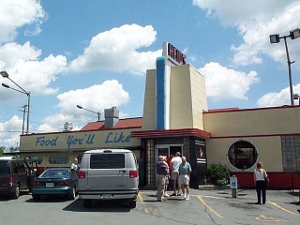 Heid's Restaurant
Heid's Restaurant
If you go east on NY State Route 5 from Syracuse, you eventually come to the town of Wampsville. There's a traffic light at a crossroads, and maybe an old gas station or general store on one corner. If you continue east you've gone too far, because the next block after the intersection announces the fact that you've entered Oneida, which is the principal city of Madison County.
So you turn around and go back, looking hard for downtown Wampsville. No, you didn't miss anything, there's nothing there. But turn right on the crossroad, and in about six blocks you come upon the county courthouse, sitting right in the middle of nowhere. All we can figure is that the representative from Wampsville once had the tie-breaking vote in a critical matter, and he traded his vote for locating the county seat in his town!
Most county courthouses are busy from 8 o'clock on, but Wampsville doesn't really open until 9. We must have looked baffled, because several times an employee asked if they could help us. We wanted the recorder's office, and the Surrogate Court. None of them knew where they were, although in the first case we were in the same building. They even had trouble telling us how to get into the main court building!
However, once we reached the recorder's office we found the same orderly shelves of deeds and mortgages we've seen elsewhere, with helpful clerks. It was a clerk who suggested we speak to the County Historian up on the fifth floor.
Sure enough, in a tiny office next to the planning department we found the Madison County Historian, who checked (fruitlessly) her index of naturalization records and who gave us several suggestions of places to look for more traces of our ancestors. She is working on the current Hot Topic: The Underground Railway, which includes many safe houses and hiding places still being discovered throughout the state.
 Heid's Restaurant
Heid's Restaurant
New York State has a law dating back to 1919 which requires each county and township to appoint a historian. Thus, in addition to the public libraries and the college libraries and the historical societies and the local museums and the churches, each historian guards local records. Additionally, local genealogical societies and hobbyists are at work transcribing cemetery records and birth, death, and marriage records and posting their reports on the Internet. This has created a web of amazing complexity, especially because many of these entities don't communicate with each other.
It's sad but perhaps not surprising that with all of these layers of information collecting, not one of these little towns seems to have published an adequate local history.
We have an idea that being a town historian in New York State is somewhat like being National Historian of the Reserve Officers Association. You get to define the job yourself, you have a lot of fun, but nobody pays any attention!
The problem, of course, is that so few people are interested in matters historical. We keep hoping to find a town historian who sees the job as educational, trying to inform the townspeople of the importance of local history, but so far the people we have found in the position are archivists and  The Waterfront restaurant
amassers of data, with occasionally some organization. Help is always offered to the inquirer, but the rest of town government doesn't care.
The Waterfront restaurant
amassers of data, with occasionally some organization. Help is always offered to the inquirer, but the rest of town government doesn't care.
All of this information-chasing makes us hungry, of course. Still looking for salt potato, we were directed to Heid's, a local landmark. No salt potatoes, but we did have outstandingly good hot dogs and pickles.
The following day we struck pay dirt. A desk clerk at our hotel was determined to find our salt potatoes, so she called her father for his advice. They directed us to the nearby town of Brewerton, on the shore of Oneida Lake, where in The Waterfront we gazed out at fishing people and boaters and tucked into pulled (barbecue) pork and Salt Potato - sweet small new potatoes swimming in a buttery sauce. When you buy salt potatoes at the local supermarket, you get a sack of these small potatoes and a sack of salt to add to the water you'll boil them in. Maybe it's the local salt, maybe it's just the idea, but it's a tasty dish that seems to recall olden days.